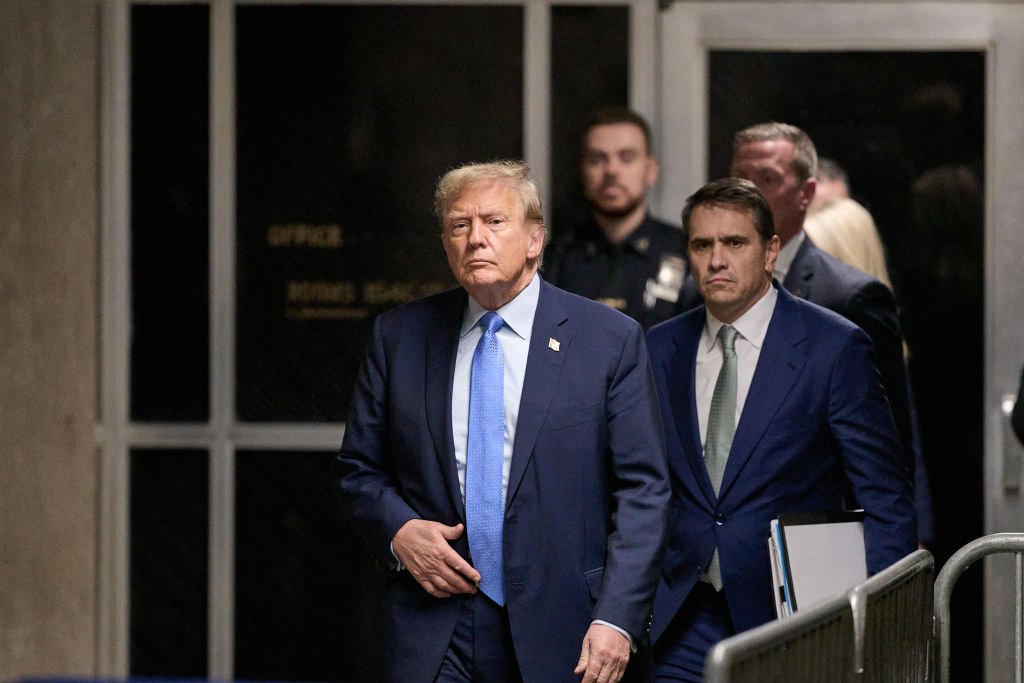The Supreme Court has the weight of the Constitution on its shoulders.
by | Apr 28, 2024 @ Liberty Nation News, Tags: Articles, Good Reads, Law, Opinion, Politics

A weighty case regarding presidential immunity was argued in front of the US Supreme Court this week, raising many constitutional issues. It is a historic case in the truest sense of the word, and as such, friend of the court briefings (known as amicus curiae) were filed by some of the sharpest legal minds in America today.
Earlier this week, prior to the oral arguments, Liberty Nation published an analysis by Legal Affairs Editor Scott Cosenza, Esq. of an amicus brief submitted by Former Attorneys General Edwin Meese* and Michael Mukasey, law professors Steven Calabresi and Gary Lawson, and Citizens United. The article, details of which were eventually picked up by FoxNews.com on Sunday, April 28, outlined the premise for their brief: that Jack Smith has no legal standing as special counsel to bring charges against Donald Trump. Justice Clarence Thomas raised this point during the hearing, bringing national attention to what LN highlighted days ago. While we await the justices’ decision, these documents raise several salient points about the question before the High Court that are worth considering.
 Today, we present three more of these briefs – all in support of
Donald Trump. The government’s position in this case has been amply
covered by the establishment media, but stories detailing the legal
arguments in favor of the former president are few and far between.
Today, we present three more of these briefs – all in support of
Donald Trump. The government’s position in this case has been amply
covered by the establishment media, but stories detailing the legal
arguments in favor of the former president are few and far between.
US Constitution: The Coolidge Reagan Foundation Brief
A brief from the Coolidge Reagan Foundation makes the point that the entire indictment against former President Donald Trump should be dismissed. This claim is based on the fact that his “actions and speech” were made while he was still in office. It only takes one step from there to recognize that if he was president at the time (and he was), then his conduct was an “exercise of executive functions.” Not only that but the authors of this brief believe holding Trump’s behavior unlawful would restrict his political speech, which violates the US Constitution.

They also point out that Democrats, notably Hillary Clinton and Stacey Abrams, have had issues with the elections they lost. Yet no claims were forthcoming by the Biden administration that it was unlawful for them to question the legitimacy of their elections. So how do their complaints add up to nothing, yet Mr. Trump is held up for indictment? This is their central question.
Thus, they conclude: “This Court should not open the door to prosecutions of former Presidents by the Administrations of their political opponents—particularly when those prosecutions arise from political speech and matters of executive discretion.”
The American Center for Law and Justice
The brief by the American Center for Law and Justice (ACLJ) addresses the issue of the alleged criminality of the former president. Its main point is that personal immunity for the actions conducted by a president not only applies when he is in office but should be extended past his term. The ACLJ claims that “immunity is only meaningful if it survives the President’s tenure.”
At the center of their argument lies the interest of the people who elected him:
This immunity protects no mere private interest, but instead protects the public interest of the people to have their chosen leader able to execute his duties not out of fear of personal reprisal, but “for their benefit.”
Christian Family Coalition (CFC) Florida, Inc.
The Christian Family Coalition of Florida takes a different tack from the other two briefings cited in this article. Dennis Grossman, who authored the amicus curiae for the CFC, argues:
“[T]he immunity issues raised in the present appeal are closely related to and overlap with the First Amendment issues raised by the underlying indictment. The issues relate to a President’s ability to address his supporters and the decision-makers who certify and control his re-election – and his First Amendment freedoms in that effort.”
The CFC believes the US Supreme Court should reverse the DC Circuit Court opinion because it violates the First Amendment of the Constitution as well as “by reason of Presidential Immunity.”
There were multiple briefs filed in this case for and against the petitioner, i.e., former President Donald Trump, which now sit in the hands of the nine justices. Although these are just a few of the briefs in support of the former president, each, in its own way, put forth considered legal reasons to either send this divisive case back to the lower courts or decide the case in favor of Mr. Trump.
According to US Supreme Court tradition, the justices take a private vote on the Friday of the week in which the oral arguments are made. This doesn’t necessarily mean that they must stick to this decision – they can change it during the time between the public hearing and when they release the final judgment.
During the oral phase of this crucial case, justices discussed many categories of presidential immunity. Still, these briefs illustrate that many tentacles of this case must be addressed. As such, they should carefully navigate such turbulent waters because this decision will ultimately affect the future of the Republic.
* Former Attorney General Edwin Meese sits on the board of Liberty Nation’s parent organization.
~
For further reading on this subject:
AMICUS BRIEF OF CHRISTIAN FAMILY COALITION (CFC) FLORIDA, INC.
Brief of Coolidge Reagan Foundation and Shaun McCutcheon
BRIEF OF AMICI CURIAE SENATOR STEVE DAINES AND THE NATIONAL REPUBLICAN SENATORIAL COMMITTEE
BRIEF OF THE AMERICAN CENTER FOR LAW AND JUSTICE
No comments:
Post a Comment